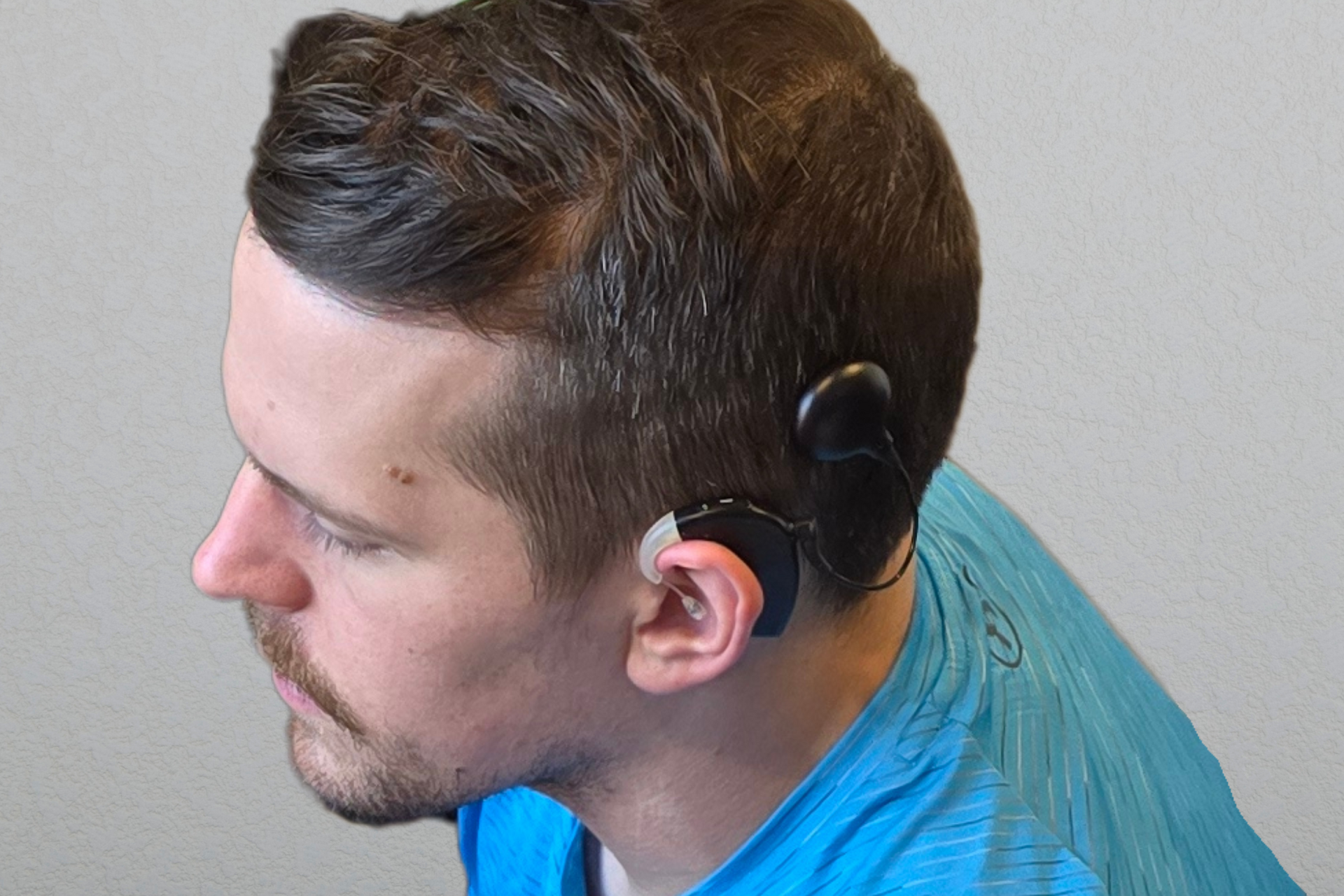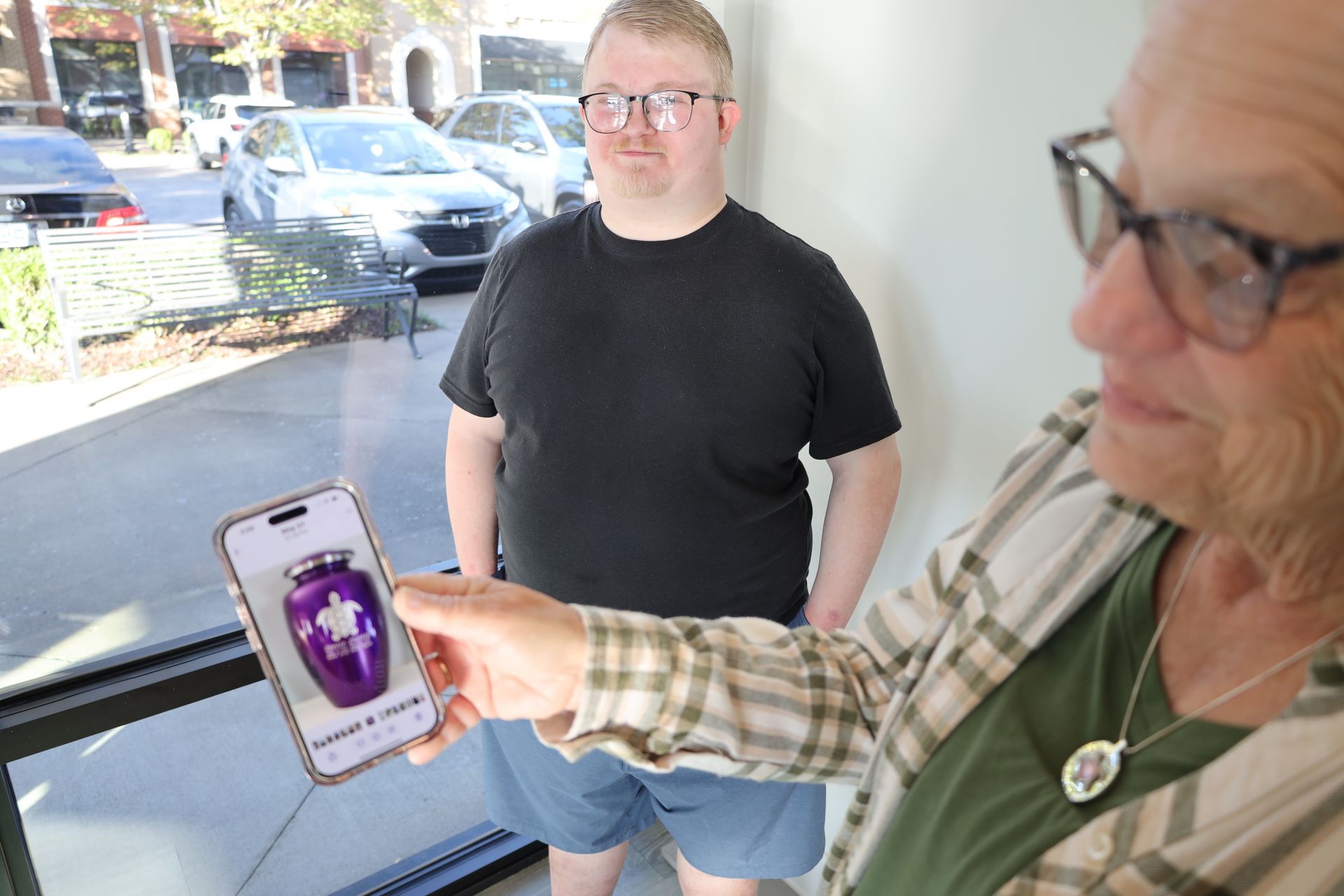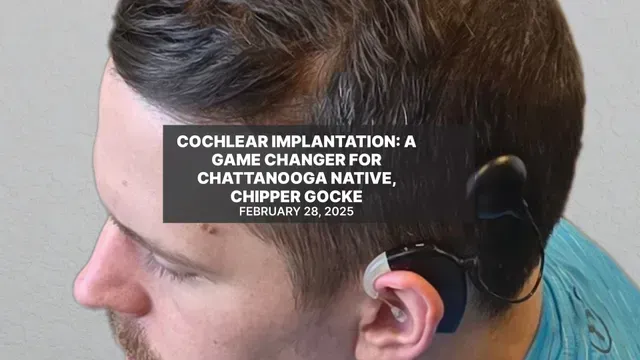Cochlear & Bone Conduction Implants
Discover life beyond hearing aids with expert cochlear implant and bone conduction evaluations, programming, and long-term care from our dedicated audiologists.
Cochlear Implant Evaluation, Programming & Long-Term Care
For individuals with severe or profound hearing loss who no longer benefit from traditional hearing aids, cochlear implants offer a life-changing alternative.
At Johnson Audiology, our experienced team provides comprehensive cochlear implant services including candidacy evaluations, surgical coordination, device activation, mapping, and long-term follow-up care in our Chattanooga and Franklin locations.

What Is a Cochlear Implant & How Does It Work?
A cochlear implant is an advanced medical device that bypasses the damaged parts of the inner ear and stimulates the auditory nerve directly. This allows individuals with severe hearing loss to perceive sound more clearly, even when hearing aids are no longer effective.
Cochlear implants include:
- An external sound processor worn behind the ear or off the ear
- An internal implant surgically placed under the skin and into the cochlea
The external device picks up sound, converts it into electrical signals, and transmits those signals to the internal implant. The brain then interprets these signals as sound.
Meet Our Cochlear Implant Doctors at Johnson Audiology

Hannah Dearth, Au.D.
Chattanooga Office Location
Dr. Hannah Dearth specializes in cochlear implant candidacy evaluations and mapping and works out of the Chattanooga, TN office. She says that it is a privilege to work with patients who are on the cochlear implant journey, guiding them from initial consultation to many years post-implantation. Dr. Dearth completed her Bachelor's degree in Communication Sciences and Disorder at West Virginia University and her Doctoral degree in audiology also at West Virginia University. Dr. Dearth sees cochlear implant patients out of Johnson Audiology's Chattanooga, TN office.

Catherine Laney, Au.D.
Franklin Office Location
Dr. Catherine Laney specializes in cochlear implant candidacy evaluations and mapping and works out of the Franklin, TN office. Dr. Laney received her Bachelor's degree in Communication Sciences and Disorders from Florida State University and her doctorate in audiology from the University of South Florida. With nearly a decade in hearing healthcare and three years of experience working directly for a leading implant manufacturer, she has an in-depth understanding of device technology, programming, and patient outcomes. Dr. Laney now brings that expertise to private practice, where she provides personalized care and advanced hearing solutions to individuals seeking to improve their hearing and quality of life.
What to Expect from Cochlear Implant Services at Johnson Audiology
We support patients throughout the entire cochlear implant journey—from initial evaluation to years of follow-up care. Here’s what that process typically looks like:
01
Initial Consultation
Meet with your audiologist to discuss your hearing history, current hearing aid use, and learn more about the cochlear implant process. We'll also review FDA candidacy criteria and begin the insurance approval conversation.
02
Hearing Evaluation
We’ll perform a comprehensive hearing test—including speech understanding with and without hearing aids—to determine if you’re receiving enough benefit from your current devices.
03
Insurance Approval
Most cochlear implants are covered by Medicare, many private insurance plans, and some Medicaid programs if your aided hearing loss meets FDA and Medicare criteria.. We’ll help guide you through the insurance approval process.
04
Surgical Referral
If you're a candidate, we’ll refer you to an ENT surgeon for outpatient implantation, typically a two-hour procedure performed under general anesthesia.
A quick recovery is common, and most people are back to normal activities in a few days.
05
Activation
Once your incision is healed, typically within 3-4 weeks, your audiologist at Johnson Audiology will activate your cochlear implant and program it to match your hearing needs. This is your first step into a new world of sound.
06
Ongoing Support
In the months ahead, your brain will adjust to hearing through the implant. We’ll provide ongoing mapping, support, and auditory rehab to help you get the most from your device.
Many patients wonder, "Is a cochlear implant right for me?" You may be a candidate if you:
- Have moderate to profound sensorineural hearing loss in one or both ears
- Struggle to understand speech even with well-fit hearing aids
- Are motivated to participate in auditory rehabilitation post-implantation
Our audiologists conduct cochlear implant candidacy evaluations using a combination of hearing tests, speech perception testing, and medical history to determine eligibility. These services are available at our Chattanooga and Franklin locations.
Are You a Candidate for a Cochlear Implant?
FAQs About Cochlear Implants
What’s the difference between hearing aids and cochlear implants?
Hearing aids amplify sound and rely on remaining hair cell function. Cochlear implants bypass damaged hair cells and stimulate the hearing nerve directly—ideal for individuals whose hearing loss has progressed beyond hearing aid effectiveness.
How much do cochlear implants cost?
Costs vary depending on insurance coverage, device brand, and surgical provider. Our staff will help you understand costs and explore your options.
What are the risks or side effects of cochlear implant surgery?
Cochlear implant surgery is generally safe and considered a routine outpatient procedure, but like any surgery, there are potential risks and side effects to be aware of.
Common short-term side effects may include:
- Mild swelling or discomfort at the surgical site
- Temporary dizziness or balance issues
- Tinnitus (ringing in the ear), which may improve or worsen after implantation
- A brief period of adjustment as your body heals
Less common but more serious risks can include:
- Infection at the surgical site
- Device failure or complications requiring revision surgery
- Facial nerve injury (rare)
- Changes in taste or numbness near the tongue
Your surgeon and audiologist will go over these risks with you in detail before the procedure. It's important to remember that the vast majority of patients experience no serious complications, and any side effects are typically short-lived.
Most importantly, the long-term benefits of improved hearing, communication, and quality of life often outweigh the risks, especially for those with severe hearing loss. Ongoing support and follow-up care from your audiologist help ensure the best possible outcome.
How long does it take to adjust to a cochlear implant?
Adjustment timelines vary for each individual, but most patients begin noticing improvements in sound clarity and speech understanding within the first few weeks after activation. However, full adjustment can take several months to a year, depending on your hearing history, age, consistency with follow-up care, and whether the hearing loss was present in one or both ears.
After activation, your brain needs time to learn how to interpret the new sound signals being sent by the implant. This is why regular mapping sessions, auditory rehabilitation, and listening exercises are critical. Some patients describe initial sounds as robotic or unnatural, but with time and training, sound quality often improves dramatically. Your audiologist will guide you through this process and help set realistic expectations at each stage of your journey.
Can you sleep or shower with a cochlear implant?
You can sleep with the internal implant, as it’s surgically placed under the skin and does not interfere with comfort during sleep. However, the external sound processor and magnet should be removed before sleeping to avoid damage and to give the skin a break from pressure.
When it comes to showering or swimming, the internal implant remains unaffected, but the external processor is not waterproof unless specifically designed to be. Most patients remove the external component before any water-related activity. Some cochlear implant brands offer waterproof or water-resistant accessories, so talk to your audiologist about options if you lead an active lifestyle.
Proper care and safe handling of your device—especially around moisture—are essential to maintaining its longevity and performance.
Explore Cochlear Implants: Guidance, Support, and Real-World Insights
Bone Conduction Implants: Advanced Hearing Solutions for Conductive & Single-Sided Hearing Loss
If you’re living with chronic ear conditions, conductive hearing loss, or single-sided deafness, traditional hearing aids may not provide the relief you need. That’s where bone conduction implants come in—offering a specialized solution that bypasses the outer and middle ear to deliver clearer sound. At Johnson Audiology, we provide comprehensive care for bone conduction implant candidates, including expert evaluation, surgical coordination, and long-term follow-up.
What is a Bone Conduction Implant?
A bone conduction implant is a medical hearing device that is surgically attached to the skull. Instead of relying on sound waves entering the ear canal, this device sends vibrations through the bone to stimulate the inner ear and auditory nerve directly.
This approach is especially beneficial for patients who cannot wear traditional hearing aids due to:
- Chronic ear infections
- Structural abnormalities in the outer or middle ear
- Conductive or mixed hearing loss
- Single-sided deafness (SSD)
Because sound is delivered via bone, patients often experience clearer, more natural hearing—even in noisy environments—without the discomfort or limitations of traditional hearing aids.
You may be a candidate if:
- You have conductive or mixed hearing loss that cannot be treated effectively with standard hearing aids
- You have recurrent ear infections or drainage that make traditional hearing aid use uncomfortable or unsafe
- You have single-sided deafness and are seeking sound awareness from your non-hearing side
- You have outer or middle ear abnormalities that prevent sound from reaching the inner ear
Our team of audiologists will evaluate your hearing, medical history, and lifestyle to determine if a bone conduction implant is the right option for you.



